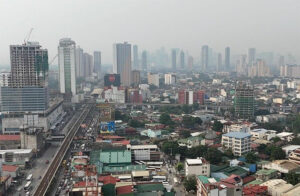




Inflation Update: Green light for easing
 DOWNLOAD
DOWNLOAD

December Economic Update: One for them, one for us
 DOWNLOAD
DOWNLOAD

Philippines Trade Update: Trade trajectories trend along
 DOWNLOAD
DOWNLOAD


Manila down 12 spots in Global Green Finance Index

Manila fell 12 spots and continued to lag behind its Asian neighbors in the latest ranking of financial centers based on their green finance performance, London-based think tank Z/Yen Group said in its latest report.
In the 14th edition of the Global Green Finance Index (GGFI), Manila fell to 81st out of 97 financial centers, down from 69th in the previous edition, with its rating dropping from 573 to 549.
The index measures the quality and depth of green financial products of financial centers and monitors their progress toward a sustainable financial system.
“There appears to be a slight drop in confidence in the development of green finance in financial centers,” the report said, noting that the average rating is down 1.96% compared to the previous edition, with only six centers improving their ratings.
In the Asia-Pacific region, the Philippines lagged behind its neighbors and ranked 19th out of 21 countries overall. Singapore was the top performer, followed by Seoul, Shenzhen, Sydney, Busan, Beijing, and Shanghai.
“The majority of centers in the region fell in the rankings, with only Singapore, Seoul, Shenzhen, Jakarta, Gift City-Gujarat, and New Delhi improving,” it said.
The average decrease in the ratings in the region was 2.66%.
Among select East and Southeast Asian territories, the Philippines ranked 14th out of 15 financial centers.
Overall, London retained the top spot in the index, followed by Geneva, Zurich, New York, Singapore, Luxembourg, Washington, D.C., Los Angeles, Stockholm, and Montreal. Lagos took the 97th and last place in the ranking, after the British Virgin Islands, Nairobi, Almaty, and the Cayman Islands.
Energy-efficient investment, disinvestment from fossil fuels, and green loans are rated as the areas of green finance with the most impact, according to the respondents.
Meanwhile, energy-efficient investment, renewable energy investment, and ESG analytics were cited as the areas of most interest.
Bangko Sentral ng Pilipinas’ (BSP) latest sustainability report said it is looking to provide more regulatory incentives to encourage green and sustainability financing among banks.
The central bank approved a temporary 15% increase in banks’ single borrower limits last year to enable them to extend loans for eligible green or sustainable projects, including transitional activities. BSP approved a gradual reduction of the reserve requirement rate for sustainable bonds issued by banks.
The report showed that in the first half of 2024, banks’ peso-denominated sustainable bond issuances stood at P236.5 billion. As of the end of March, the total reserves generated from sustainable bonds issued by banks were recorded at P1 billion. — Aubrey Rose A. Inosante
This article originally appeared on bworldonline.com





 By BusinessWorld
By BusinessWorld